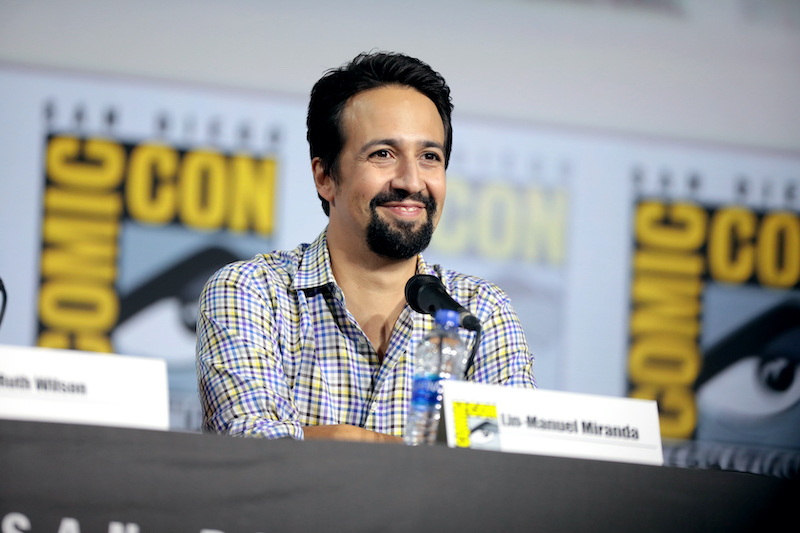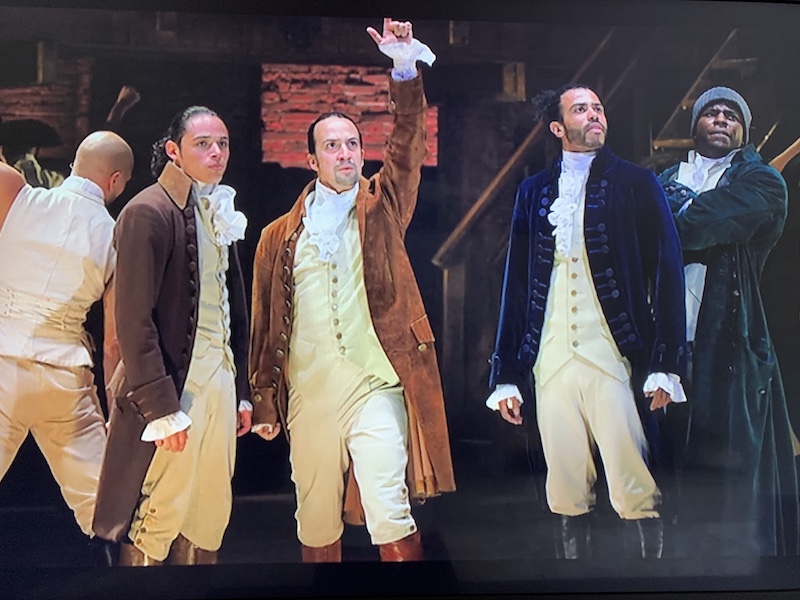The Richard Rodgers Theatre on Broadway went from dark to light during the recently past Independence day weekend, if only digitally, when Disney+ started streaming “Hamilton”, the live-performance film of Lin-Manuel Miranda’s hit Broadway musical that tells the story of Alexander Hamilton in a modern-day reinvention of the past.
When watching the musical, one is transported back, firstly to a time when sitting in close proximity to strangers was a normal occurrence. The director Thomas Kail with the help of the cinematographer Declan Quinn elevates the watcher not only to the best seat in the house, but right on stage with the actors so that perspiration on the forehead of Hamilton’s rival frenemy Aaron Burr (played by Leslie Odom Jr.) and the spittle flying from Jonathon Goff’s King George the III is clear to see.
One is also transported back centuries past to see how the “bastard, immigrant, son of a whore” rose up from the dredges he was born into to join his fellow anti-British revolutionary companions- Laurens, Mulligan, and Lafayette- to alas to become Commander-in-chief George Washington’s right-hand man. The emotional turmoil elicited by numbers including Hamilton’s wife Aliza Schuyler (Phillipa So) and her sister and Hamilton’s love, Angelica Schuyler (Renée Elise Goldsberry) adds a sweeping richness to the show in addition to the political affairs.

The story of Alexander Hamilton is a timeless one. An immigrant, a nobody, a man with unmatched ambition prepared to use his sheer talent, brains and will to propel him to heights his wildest dreams imagined for him. Perhaps the most brilliant part of Hamilton is the homogenization of an older liberal-leaning culture with a more fundamental conservative American philosophy. Within the vibrant and multicultural cast members that modernize the story of our Founding Fathers lies an American patriotism, optimistic and bold.
It’s woven into the fabric of the play; represented explicitly by the first-generation Puerto Rican Miranda who plays the ten-dollar-founding father-without-a-father Alexander Hamilton. “I am not throwin’ away my shot,” Hamilton sings with an intense resolve that appears to be as much a source of affliction for him as it is his source of motivation.
While literalists complain about the ethnic inaccuracies of Hamilton’s founding fathers and critics elevate the ironic nature of slave-owners being played by African American’s, the beauty of one of the many lessons of the show is to be found in those imprecisions.
Lin-Manuel Miranda portrays, in perfect timing, the reclaiming of the American identity and story by minorities who have been left out historically. It’s empowering, it’s uplifting, and it’s unifying at the very core. It’s more than inclusivity; it’s an acknowledgment that the American ideal of individualism rises above one’s ethnic background, especially important in a time when group identity is increasingly becoming the only lens in which we view one another.
Hamilton, while reckoning with a past that’s wrought with contradiction and amorality, uses our history to tell a beautiful tale of triumph that alas says, “this is our story too, and we are proud of it.”
There’s a silent desperation to cleanse ourselves from America’s shameful past. Without buttress, being ashamed leads to erasing or destroying. This is the kind of premise fundamentally inscribed in behaviors like statue-tearing and cancel culture. It’s also a primary tenet of the New York Times’ 1619 Project which rearranges American history from a nation built on not yet actualized ideals of freedom and self-governance to one built on the desire to maintain the degradation and enslavement of black people.
“Who lives, who dies, who tells your story?” The musical Hamilton doesn’t supersede this timeless piece of wisdom. Many will watch this masterpiece and call it a part of a long-lost era that was the year of 2016. This story will be used as just another leg in a larger and more sinister narrative of America’s unending oppressiveness.
But in banishing Lin-Manuel’s tale into an underworld where the rest of American history lies, a central message of unity unnecessarily goes with it. A central message that unites Americans, despite the vibrant and beautiful differences that make up this country- as Thomas Jefferson (Daveed Digs) puts rather simply, “Life, liberty and the pursuit of happiness. We fought for these ideals; we shouldn’t settle for less.”






